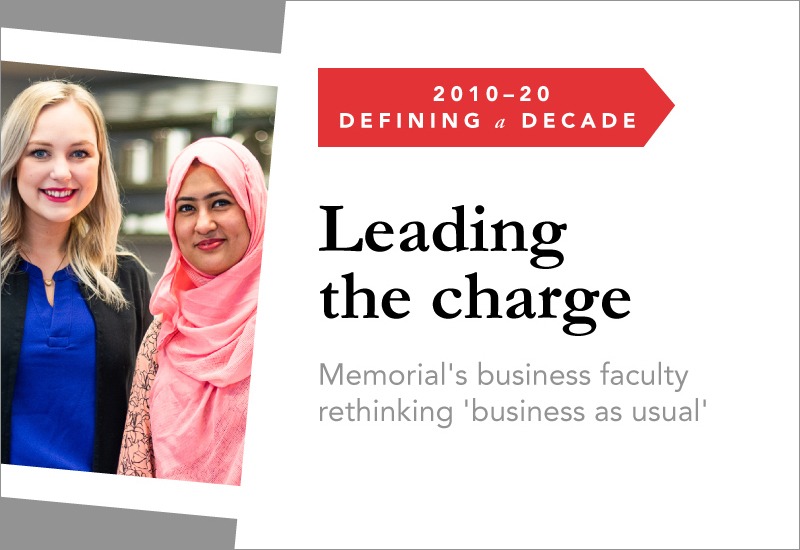Leading the charge

There is a shift underway in the business world.
That shift is changing not only how we think about business, but how we deliver business education.
At Memorial University, we’re challenging the idea of what it means to be a business leader, and rethinking how we prepare our students to be those leaders.
What trends are we seeing in the business world locally, nationally and internationally? What role do we play in contributing to the future and well-being of Newfoundland and Labrador?
We’re striving to address these and other questions by constantly evolving, challenging boundaries and valuing innovation.
Through programs, research and curricula, the past decade has seen Memorial’s Faculty of Business Administration become a national leader in delivering business education for today – and tomorrow.
Here are some highlights from the past decade.
The shift to social enterprise
Memorial’s business faculty attracted national attention when it launched Canada’s first master of business administration in social enterprise and entrepreneurship (MBA-SEE) in 2018.
The program aims to train a different kind of business leader for a new way of doing business by developing graduates who are committed to sustainable and social business practices. The first cohort of students began its studies in the fall of 2019.
In 2018 the business faculty announced its first Tier 1 Canada Research Chair (CRC). Dr. John Schouten, CRC in Social Enterprise, focuses on advancing social enterprise as a viable alternative to corporate business models, an approach he says puts “communities first.”
Supporting community resilience
Dr. Natalie Slawinski has been undertaking innovative research with Shorefast to explore its social enterprise model and evaluate whether its success can provide lessons that may be applied in other communities across the province.
Along with Dr. Schouten, Dr. Blair Winsor, Dr. Mark Stoddart (Faculty of Humanities and Social Sciences), Dr. Wendy Smith (University of Delaware) and Diane Hodgins (Shorefast), Dr. Slawinski developed the P.L.A.C.E. model for community development.
This model identifies five lessons from Shorefast’s international success that may be applied elsewhere to bolster community resilience.
Tangible experiences
In 2017 Memorial launched the Centre for Social Enterprise, a campus-wide centre that aims to develop new social entrepreneurs, strengthen existing social enterprises and build resilience through social innovation to foster sustainability throughout Newfoundland and Labrador. The centre was initiated as a unique partnership between the business faculty and schools of Social Work and Music.
One of the centre’s successful initiatives is collaboration with local non-profit agencies and social enterprises to offer work placements for Memorial students.
These placements allow students to gain tangible professional experience while also helping to support and grow local social enterprises.
Fostering student success
While the phrase “social enterprise” may be new, the concept is not – neither in the province of Newfoundland and Labrador, where co-operative arrangements have a long history in rural communities, nor at Memorial, where Enactus Memorial built a reputation over the past decade as one of the most successful Enactus teams in the world.
Enatus is an international non-profit organization that mobilizes post-secondary students to develop projects that use business processes and models to improve the lives of people in their communities. Each year, teams from around the globe compete to showcase the results of that community impact.
In 2017 Enactus Memorial won its 10th national title after earning its second world title in 2016.
The undergraduate student team has developed a wide range of projects, each designed to address a specific social need.
Prince’s Operation Entrepreneur, for example, helps transitioning members of the Canadian military find new careers as entrepreneurs. Project SucSeed aims to improve food security in Canada’s North and is now a self-sustaining social enterprise.
Most recently, Project HeartStarter aims to use drone technology to deliver automated external defibrillators to people suffering from cardiac arrest who don’t have immediate access to medical care.
After a decade during which Memorial’s business faculty has created a culture of firsts, the Faculty of Business Administration plans to spend the next 10 years reinforcing its position as a thought leader and champion of sustainability, innovation, inclusion and prosperity all over the world.